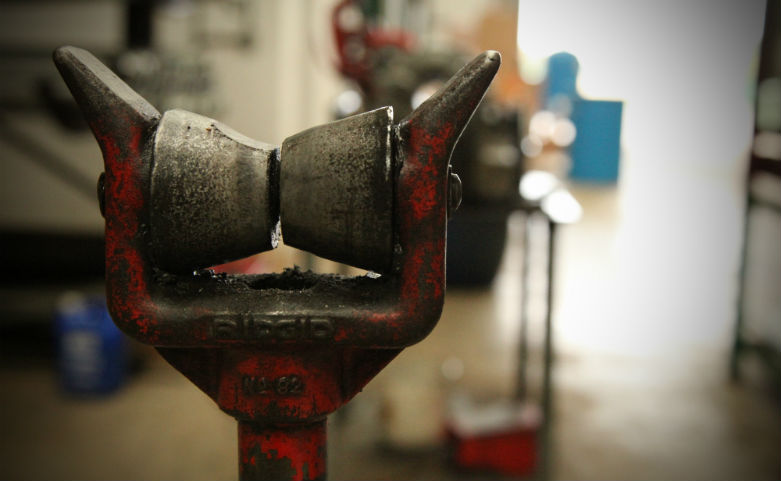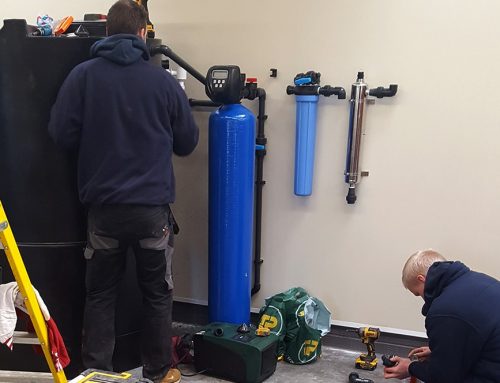We recently worked with the Water Well Journal to produce an article that looked at the UK and US groundwater industries from the view point of both a veteran water well contractor and a professional who has been in the industry shorter amount of time.
Two of our directors, Chris Dodds and Jonathan Dalton stepped up to the plate to answer the questions. Part 1 of the article featured Chris’s answers and was printed in the May 2013 edition of the Water Well Journal. You can read the interview below:
About Chris Dodds

The Dales Water Directors, Chris Dodds second from the right.
One of the founding directors of Dales Water Services Ltd at its formation in 1979, Chris is one of the UKs leading authorities on borehole water supplies. Having been involved in water well supply systems since the 1960s, he has a vast understanding of what it takes to deliver projects from small scale domestic installations through to large supplies for multinational industries and large scale farming concerns. Chris is still involved in the day to day operation of Dales Water Services Ltd.
1. What is the most important issue you are dealing with as a water well contractor today?
Over the past 20 years Health and Safety has become the most important aspect of what we do. This has always been something that has been considered but the part it plays in every job is now vastly increased with suitable Risk Assessment Methods Statements (RAMS) having to be produced for every individual site. Focus was also previously on safety with little attention being given to work related health conditions which has also changed.
2. How do you see the groundwater market today?
Water is as important today as it was over 20 years ago and consequently the industry is still thriving but it is now a very crowded and competitive market place. Several companies have come into the industry trying to make quick money at the expense of standards, the Environment and the customer. However, if the customer is sufficiently and honestly advised in part by the driller / engineer they usually make the best and right decision.
3. Where do you see the market going in the coming years?
With client focus now on renewable energy, cost minimization (against mains water) and long term infrastructure thinking, there is no reason that the groundwater industry will not continue to thrive in coming years. The market will no doubt remain competitive but as long as those who want to carry out work to the highest standards maintain their efforts those companies and people involved should be able to deliver high quality projects but also make good livings.
4. What do you think has made the biggest impact in the water well drilling industry in the last 20 years? Is it a new innovation, technology, rule, etc.?
Prior to April 2005 in England and Wales, Scotland being under a different system and regulator, every borehole / water well drilled required an abstraction licence from the Environment Agency.
This requirement gave absolute control to the regulatory authorities over what activities took place in the groundwater industry, it created additional paperwork but protected groundwater resources.
In April 2005 deregulation took place so that any individual or company could abstract up to 20m3/day (approximately 4,400 gallons) without the requirement for an abstraction licence from the Environment Agency. This had positive and negative impact on the groundwater industry in England and Wales.
Positively, many sites fell out of regulation, such as domestic householders, who really did not require high level regulation and monitoring. People who may have previously been put off from having a water well supply because of regulatory requirements were now interested in having a supply, thus increasing demand.
However, negatively, the groundwater industry was inundated with companies who were out to make a ‘fast buck’ with little care for the customer, the Environment or the regulator. These companies have taken the relaxation of the law into their own hands and taken full advantage of a scheme that was in place to save the regulator, customer and contractor additional paperwork in a (relatively speaking) water rich country.
Customers have had poor installations, the Environment has been impacted (aquifers have been mixed degrading overall water quality in groundwater units) and contractors and customers are drilling water wells and boreholes and just saying that the supply is for less than 20m3/day (4,400 gallons) when they are actually abstracting much more water than this . Legitimate contractors who advise of the correct procedures and requirements are consequently more expensive and lose business.
5. How is contractor safety different now than when you first started in the water well industry?
In the 1970s the relationship with health and safety was considerably different to how it is now. It was there but was there as a secondary issue to ‘getting the job done’.
This is definitely no longer the case. With the introduction of modern laws and modern thinking the primary responsibility of any work that we undertake is now to do it safely so that everyone can go home at the end of a working day in the same state that they arrived at work in, and if anything better, with the introduction of dedicated health and safety consultants offering initiatives such as free telephone counseling.
This change in attitude has created more work but, more positively, has provided an additional mechanism to train staff to high standards, win business and make additional money.
6. How big an impact have government rules and regulations been on the industry in your time as a driller?
As we discussed in question 4 it is evident that government rules and regulations have had a considerable impact on the industry. They continue,and will no doubt
continue well into the future, to have a large and significant impact on the industry. Some of the regulations brought in to control, monitor and improve things have definitely been of value.
The Water Resource Act, to protect the water environment, or the Private Water Supplies regulations, to maintain standards of infrastructure and water quality for householders, have definitely been positive moves and have impacted the industry positively without being over bearing. However, occasionally the government has got things wrong and as a consequence those in the industry who want to do things properly have suffered.
7. I’ve heard fair and accurate pricing has been an issue in the industry for decades. Do you still think it a problem? What can solve it?
This industry is unique, there is no other industry like it. There are different drilling methods and techniques’, drilling for groundwater is part exploration every time despite good scientific knowledge through hydrogeology, and infrastructure choices are subjective.
This, amongst other things, effects price both for the company and customer involved and it has been like this for a long time. However, things are improving as better ways of communication with customers both written and verbally can explain the different pricing options that face them.
Support from industry leading organizations and suppliers resolves, to some extent, infrastructure choices and education of staff and management limits the potential for inaccurate pricing. The latter being the most important element in preventing inaccurate pricing.
8. Do you find customers more aware of details about their water system than 20 years ago? Do you feel they’re more educated because of information that can be found online?
The internet is useful; it provides a bank of data and information that can be accessed quickly efficiently and assist in delivering the project. The chances are that if you are facing a technical problem that you haven’t seen before, and that can still happen even after 20 years in the industry – (every site is different), then someone , somewhere in the world will have also faced it and perhaps put a helpful hint on the internet.
However, this is a double edged sword. Customers are definitely more educated than they were 20 years ago and a lot of this is derived from searching the internet. However, when we use the internet we are cautious about the information that we are getting. We are aware that that there is a vast amount of information on the internet from people with different experience that can do more harm than good. We are always selective based on past experience and knowledge.
It is often the case that customers are far from selective as to where they attempt to source information from. They are more aware of their water system than they were 20 years ago but often they have taken something as gospel when they have read it online, when a. it is incorrect or b. it may be correct but is not correct for their situation.
This leads to them making poor decisions, becoming unwilling to listen to advice from people who have been doing this for a long time, and designing a system that will never work. At this point we are asked to install to their design when we know that it is flawed leading to an uphill battle to convince them otherwise, even though we will do the design element of most projects for free.
9. How have you seen the importance of professional development and trade associations change in your time?
Personal professional development for staff and management has become very important. Having a highly skilled, varied and knowledgeable work force is now key to winning, and completing jobs successfully. People also want this for themselves, it is no longer just about take home pay as it was over 20 years ago. Don’t get me wrong that is still important, but people now want a package to include their development and knowledge base to improve them personally.
Trade associations are a mixed bag. There are those associations who have appeared in the last 20 years which have sought to improve standards, education, knowledge and technology. Unfortunately some have appeared for appearances sake, and there a lot of them, and will let any contractor in and advertise it on their literature, no matter their experience or contribution. This, unfortunately, misinforms customers.
10. Do you still remember a piece of advice you got when you were early in your career? Who told it to you and what was it?
Harry Wilson, a driller during the Second World War and into the 1960s always told me
‘If you’re going to do it, do it right’.
Something that I still live by today on every contract I’m involved in.



